Behind the Curtain: Poetry Alumni [Spring 2022]
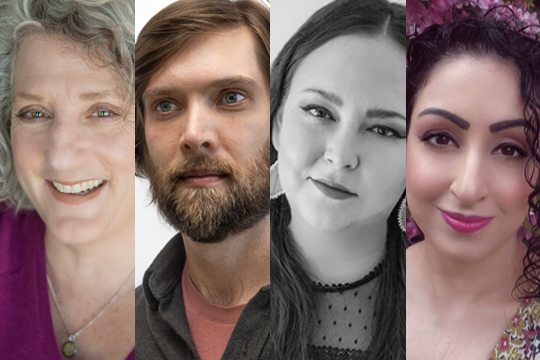 It's National Poetry Month and spring is finally upon us.
It's National Poetry Month and spring is finally upon us.
To celebrate, we invited poetry alumni Nancy Jo Cullen, Andrew Faulkner, Liz Howard, and Sheniz Janmohamed to share elements of craft and process from their most recent books...
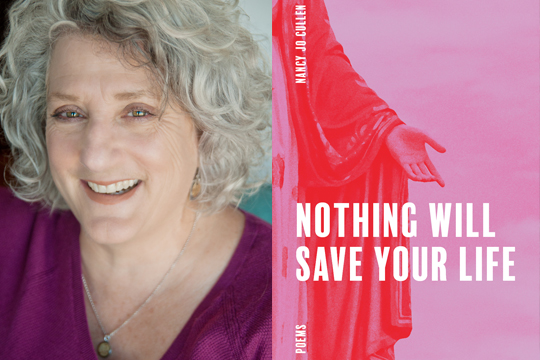 Nancy Jo Cullen
Nancy Jo Cullen
2008 Cohort
Nothing Will Save Your Life
April 2022 (Wolsak & Wynn)
When I started writing Nothing Will Save Your Life, I didn’t know I was working toward a book. I hadn’t written poetry for nearly a decade but in 2015 I found myself thinking of poems again. I moved to Kingston in 2017 and connected with a group of poets, we’d meet up periodically to workshop and talk about our poems. Then covid struck and we began to meet regularly over zoom. This process of having my work deeply considered by writers whose opinions I trust has been unbelievably beneficial to my writing. Our meetings have not only improved my writing, they’ve also been a balm to my soul – and I am not using hyperbole. What a gift trusted readers are. The sharp thinking of Ashley-Elizabeth Best, Sadiqa de Meijer, Ying Lee, Kirsteen Macleod, Susan Olding, and Sarah Tsiang has been everything I never guessed I needed. I worried about joining a writing group and I still think joining a writing group should be something that one approaches carefully. Nevertheless, I know I am so fortunate to have been welcomed into the villanelles’ fold and to have regular doses of their energizing thinking.
Nancy Jo Cullen’s poetry and fiction have appeared in The Puritan, Grain, filling Station, Plenitude, Prairie Fire, Arc, This Magazine, Best Canadian Poetry 2018, Room, The Journey Prize and Best Canadian Fiction 2012. Nancy is the 2010 recipient for the Dayne Ogilvie Prize for LGBTQ+ Emerging Writers. Her novel, The Western Alienation Merit Badge, was short-listed for the 2020 Amazon Canada First Novel Award. Her fourth poetry collection is Nothing Will Save Your Life.
Upcoming: Nancy Jo will be at our CW MFA Speakeasy Reading Series, April 25 at 8pm online (event link will be posted here: https://www.facebook.com/events/1190825981452906).
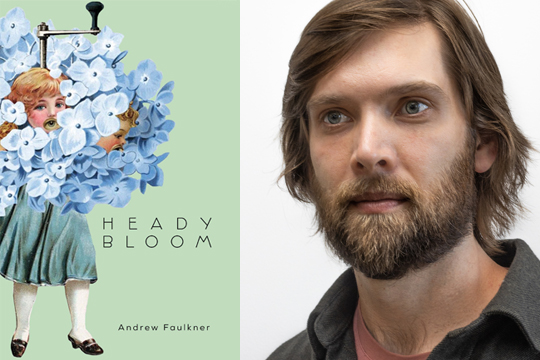 Andrew Faulkner
Andrew Faulkner
2007 Cohort
Heady Bloom
April 2022 (Coach House Books)
Heady Bloom opens with a long poem, titled “On Visions”, that I began writing by accident.
Both my maternal grandparents had recently died and I was foggy with grief. Doing a bit of genealogical research – I reasoned that perhaps it would help me pin down my sorrow – I typed an old family name, Alsgard, into a search engine. Except I misremembered the name, searched for “Hildegard”, and found myself on the Wikipedia page for Hildegard of Bingen, a twelfth century Christian mystic who was beset by visions that carried her into illness.
At the time, I’d been suffering from constant headaches, the source of which was unknown. And I was living in a small town called Marmora, notable only for a giant abandoned open-pit mine, and for a farmer’s field, owned by the Greensides family, where a handful of people claim to have seen the Virgin Mary. I jogged by the field with relative frequency and every time was struck by how unremarkable it seemed.
I had jotted the phrase “Hildegard saw it before she knew what it was.” I had the names of the people who testified to seeing Our Lady in a field. And I wondered if what they saw was caused by a certain density of faith, or maybe by a clump in the brain. (I was currently awaiting the results of an MRI that would reveal whether I had a clump in the brain. I would eventually learn my brain contained “just the usual lesions”, which was not as comforting as the neurologist intended.)
I thought I might be able to locate a small poem somewhere in these slipstreams of confusions and ambiguities. Turns out there was more there than I’d expected.
Andrew Faulkner is the author of two books of poetry, Heady Bloom and Need Machine, and several chapbooks, one of which was shortlisted for the bpNichol Chapbook Award. He has an MFA from the University of Guelph and lives in Picton, Ontario, where he works as the managing editor of Invisible Publishing.
Upcoming: Find Andrew at the Vibrant Voices stage at Word On the Street Toronto, June 11-12 (time/date TBD).
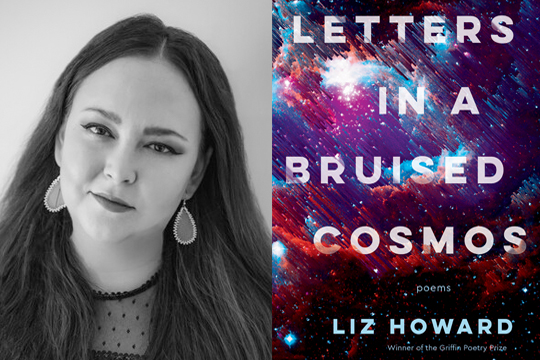 Liz Howard
Liz Howard
2012 Cohort
Letters in a Bruised Cosmos
June 2021 (House of Anansi)
There are three poems in Letters in a Bruised Cosmos that share the same title, “Superposition”. This refers to the principle of quantum superposition, in which quantum systems are said to be in multiple states (probabilities) until they are measured. I am of course bringing a poet’s sensibility to all of this and it is used here as an extended metaphor for subjective experiences of being between states of “life” and “death”. The visual appearance of these poems reference the double-slit experiment, which was an early demonstration of quantum superposition, namely that of light’s wave-particle duality. The first “Superposition” poem is arranged on the page in a kind of wave pattern and resembles an undulating river. The poem relates an experience of near-drowning in a river at a young age. The second “Superposition” poem appears as one long “corridor” stanza that terminates in two paired “box or “slit” stanzas. The first stanza evokes in its shape both the hallway the subject has to walk down to clean up after a dog, and thus experiences self-reflective consciousness through an experience of abjection (encountering bodily cast-offs that suggest death, the vulnerability of materiality, and cause a separation between the self and world), the aisle between church pews that must be walked down to reach the confessional booth, and also a “space” a photon might be launched into before reaching one of the slits in the double-slit experiment. The paired terminal stanzas evoke the confessional booth, with its compartments for confessor and priest, and also the double-slits in the famous experiment. The final “Superposition” poem is arranged in several thin columns, with one word per line (reading downward – across is less intelligible but that is also a “point”) and evokes the interference pattern result of the double-slit experiment and relates a returning to consciousness in an episode of violence where the threat of death is a present reality.
Liz Howard is the author of Letters in a Bruised Cosmos, shortlisted for the 2022 Griffin Poetry Prize, and Infinite Citizen of the Shaking Tent, which won the 2016 Griffin Poetry Prize. Howard received an Honours Bachelor of Science with High Distinction from the University of Toronto, and an MFA in Creative Writing from the University of Guelph. She is of mixed settler and Anishinaabe heritage. Born and raised on Treaty 9 territory in northern Ontario, she currently lives, writes, and teaches in Toronto.
Upcoming: Liz will be the Victoria College Shaftesbury Creative Writer-in-Residence at U of T this fall. Watch for the 2022 Griffin Poetry Prize Announcement, June 15 via the Griffin Trust's social media channels.
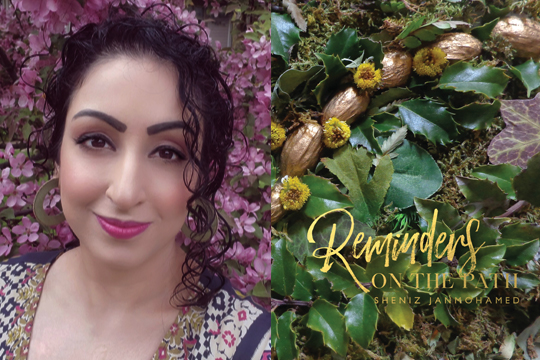 Sheniz Janmohamed
Sheniz Janmohamed
2006 Cohort
Reminders on the Path
September 2021 (Mawenzi House)
When I was growing up, my dad would take my sister and I to Scarborough Bluffs and teach us how to skip rocks. As much as I tried, I only ever succeeded once or twice. Something about the angle, the patience, the flick of the wrist, and the precise act of lining up the flat rock with the horizon of the lake.
I wanted each stone to break the sky-mirrored surface of the water, and widen into ever-expanding ripples. But I was too impatient. My stones kept sinking.
Years later, I’m still learning to patient. To sit with place, and not demand, or expect, a response. A next to impossible task in a time when we are constantly demanding or demanded of.
When I was finishing Reminders on the Path, we were deep in the muck of the pandemic. My words felt like stones that kept sinking to the bottom. How can I write beauty in the midst of such a pervasive grief? Where do I find the words when the world feels like it’s on fire, and everything in me wants to run? I still don’t have the answers to these questions, but I did find a path through them — a way to allow meaning to make me, instead of attempting to make meaning of what rarely made sense.
Now, months after its release, I set aside my copy of Reminders on the Path and return to little me, standing in front of the lake. While most of my attempts failed, for just one moment, I was able to hold my attention to create a ripple on the water. And maybe, just maybe, that was enough.
Sheniz Janmohamed was born and raised in Tkaronto and has ancestral ties to Kenya and India. A poet, nature artist and arts educator, she regularly visits schools and community organizations to teach and perform. She has three collections of poetry, published by Mawenzi House: Bleeding Light (2010), Firesmoke (2014) and Reminders on the Path (2021). Sheniz recently served as the Writer-in-Residence at the University of Toronto Scarborough Campus. Learn more here: www.shenizjanmohamed.com
Upcoming: Sheniz will be participating in Lunch Poems at SFU, May 18 at 12pm (free registration: https://www.eventbrite.ca/e/lunch-poems-presents-sheniz-janmohamed-michael-prior-online-registration-305948489167).
 It's National Poetry Month and spring is finally upon us.
It's National Poetry Month and spring is finally upon us. Nancy Jo Cullen
Nancy Jo Cullen Andrew Faulkner
Andrew Faulkner Liz Howard
Liz Howard Sheniz Janmohamed
Sheniz Janmohamed